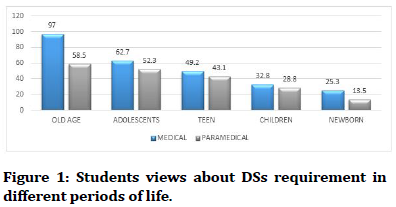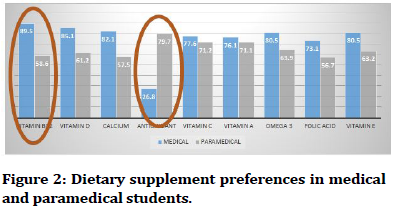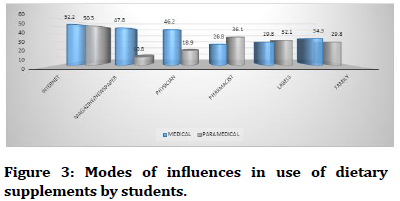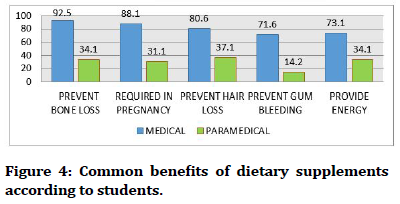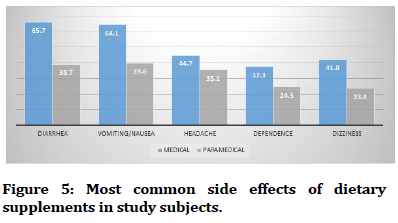Research - (2021) Volume 9, Issue 9
Perceptions of Dietary Supplements in Students: Do you Really Need Them?
Lekshmi Harilal1, Ammar Al Homsi1, Raghd Adnan1, Mohammed Faraz Khan1 and BK Manjunatha Goud2*
*Correspondence: BK Manjunatha Goud, Department of Biochemistry, RAKCOMS, RAK Medical and Health Sciences University, UAE, Email:
Abstract
Introduction: The dietary supplements (DSs) use has been on rise in the recent years and their use for various reasons with or without medical advice. It is very important to know that DS have not been regulated and many untested are sold in market. This study was conducted to know the DS use in university students and their knowledge about them. Materials and methods: The study was conducted in RAK Medical and Health Sciences University. After the ethical clearance and standardized questionnaire were applied on study subjects. Surveys were briefly assessed by the survey team for completeness on location and data entered into Excel sheet for analysis. Results: The study results showed that majority of students 85% medical and 67% of paramedical were consuming the dietary supplements (DSs). Only 65% of medical and 32% of paramedical students were using DSs under doctor supervision. The most common DS were multivitamins, antioxidants, Vitamin D, Calcium etc. Majority of students influenced by internet, magazine and newspaper advertisements. Discussion and conclusion: Many studies have shown the adverse effects of DS use without medical advice, but still younger population use them. This is a major concern for medical professionals. It has been shown by studies that excessive use of vitamin may have deleterious effects on body. The life style changes, excessive marketing has led to its use and must be stopped. A healthy balanced diet will provide all the essential nutrients required for body. Finally, the DSs use should be restricted under medical supervision.
Keywords
Dietary supplements, Students, Side effects, Benefits
Introduction
The Nobel laureate Linus Pauling claim in the 70’s about use of ascorbic acid above the recommended daily allowance to prevent common cold have stimulated the people interest in the use of vitamin supplements [1,2].
The dietary supplements use in the recent years has been increasing especially among younger population. According to studies, the acceptance and their sales have soared in recent years and data from 2009 showed that global market worth of €45–50 billion [3]. The increase use was seen worldwide and studies reported that the demand increased in the Middle East, particularly in the Gulf Cooperation Council (GCC) nations [4–7].
The studies have shown in United Arab Emirates (UAE) the growth of its use been increasing and reasons can be attributed to government information campaigns with a high level of media attention, which continues to have a positive impact on Dietary supplements (DS) consumption [8].
The National Institute of Health’s Offices of Dietary Supplements has defined dietary supplements as products intended to supplement the diet and which contain one or more dietary ingredients [9].
Dietary supplements were defined in a law passed by Congress in 1994 called the Dietary Supplement Health and Education Act (DSHEA) [10]. DSHEA defines supplements and outlines quality, safety and efficacy regulations that are different from those for drugs. The U.S. Food and Drug Administration do not review dietary supplements for safety or effectiveness before they are sold.
The following are examples of dietary ingredients defined as dietary supplements by the DSHEA of 1994 [2,5].
• “Vitamin: Vitamins A, D, E, C, B6, B12, thiamine, riboflavin, niacin, folate, biotin, pantothenic acid.
• Mineral: Calcium, iron, zinc, magnesium, manganese, selenium, copper, chromium, iodine
• Herb or other botanical: Garlic, gingko, chamomile, dandelion, milk thistle, capsicum, valerian, yohimbe, guarana.
• Amino acid: Lysine, tryptophan, cysteine, isoleucine, methionine, valine.
• A dietary supplement used to supplement the diet by increasing the total dietary intake: Fish oil, blue-green algae, bee pollen, bone meal, melatonin
• Concentrates, metabolites, constituents, or combinations: Allicin (from garlic), gingko ginsenosides, bilberry extract, chamomile tea [2,11].
The DSs have been suggested to be used to improve health status, preventing nutritional deficiencies, boosting immunity and reducing stress [12-14], but exact benefits still not proven [15-17].
The other problem with DSs are they are not regulated properly, the DSHEA is responsible for ensuring that supplements are safe and also that advertising is not false or misleading, thus eliminating Food and Drug Administration (FDA) approval before marketing [18]. This means manufacturers do not have to prove the efficacy and safety of a dietary supplement to the Food and Drug Administration (FDA) before it is produced, sold, or marketed [19]. Consequently, there are many untested products in the market place. Moreover, various potential risks have been described when using DS in high doses or without medical supervision, especially because they can be purchased without a prescription [20]. Given the increasing prevalence of DS and prescription as well as Over-the-Counter (OTC) medication usage among consumers, healthcare providers and health educators have expressed concerns regarding the potential for drug-supplement interactions as well as other safety concerns [21,22].
In other words, as stated by the American Cancer Society’s webpage on dietary supplements, “drugs are viewed as unsafe until proven safe” whereas “dietary supplements are viewed as safe until proven unsafe” [23].
Based on these facts and scarcity of studies among use of DSs in students, the study was conducted to know the perceptions and awareness about DSs in university students of RAKMHSU.
Materials and Methods
The study was conducted in RAK Medical and Health Sciences University. The study was a randomized questionnaire based study. A total 300 participants selected out of 1000 students. Every 3rd student was selected for the study using their attendance sheet keeping in mind age and gender. After the institutional ethical clearance, the standardized questionnaire was applied on the study subjects. The questionnaire was standardized by applying on few students who were not part of the study. Their views were considered in changing the questions and data was entered into SPSS and Cronbach’s alpha with >0.7 were considered and included in the questionnaire.
The study groups were divided into TWO groups; Medical and Paramedical. The investigators approached during their class hours with the permission of faculty and questionnaire were distributed to the selected participants. Participants were asked to complete questionnaire privately on the spot within 10-20 minutes. Additional clarification was provided if needed. Surveys were briefly assessed by the survey team for completeness on location and data entered into Excel sheet for analysis.
The questionnaire consisted of demographic information, which dietary supplement they take commonly, their knowledge and side effects.
Results
The study results showed that majority of students 85% medical and 67% of paramedical were consuming the dietary supplements (DSs). Only 65% of medical and 32% of paramedical students were using DSs under doctor supervision as shown in Table 1.
| Questions | Medical | Paramedical | ||
|---|---|---|---|---|
| Yes | No | Yes | No | |
| Do you take DSs on doctor advice | 65% | 35% | 32% | 68% |
| Are you influenced by labels? | 42% | 58% | 12% | 88% |
| DO you think DSs replace normal diet | 13% | 87% | 22% | 78% |
| Do you check the contents in DSs? | 72% | 28% | 49% | 57% |
| Do you still consume DSs after knowing the side effects? | 34% | 66% | 56% | 44% |
Table 1: Views of students about various aspects.
There was high percentage of students in both groups suggested that DSs essential for old age people when compared to other age groups as shown in Figure 1. In terms of reading labels and get influenced, 42% medical and 12% paramedical agreed they get influenced apart from internet advertisements. But 72% medical and 49% of paramedical students check the contents regularly before their use as shown in Table 1.
Figure 1. Students views about DSs requirement in different periods of life.
Majority in both groups 87% and 78% did not endorse that DSs are replacement for normal diet. The most common DSs were vitamin B12 in medical and antioxidants in paramedical students as shown in Figure 2. The study also showed that modes of awareness in both groups influenced mainly by internet as shown in Figure 3.
Figure 2. Dietary supplement preferences in medical and paramedical students.
Figure 3. Modes of influences in use of dietary supplements by students.
The Figures 4 and 5 shows that the reason why they prefer DSs and their common sides effects. The common sides effects in both groups was diarrhoea and vomiting/ nausea, in-spite of theses sides effects 34% medical and 56% of paramedical still take DSs on daily basis.
Figure 4. Common benefits of dietary supplements according to students.
Figure 5. Most common side effects of dietary supplements in study subjects.
Discussion
The intake of DSs without advice has been a serious concern for the medical profession. This is most commonly seen in younger population and been stimulated by various factors to consume the supplements. A study showed that apart from beneficial effects there inadvertent use leads to adverse events and consulting health care professional is important [24].
In our study showed that 35% medical and 68% paramedical students were using the DSs without the advice and is a major concern.
Many studies suggested that the most common use of supplements was multivitamins, proteins, vitamin C and others [25-27], our study also showed multivitamins use was major in medical students and paramedical use more of antioxidants. The use of vitamin supplements by these students is expected because they are more readily available and easily accessible to them than the herbal or other supplements.
Our study also found that many students experienced diarrhea, vomiting, nausea as the common side effects of dietary supplements. This correlates with study by Ernst et al, which showed excessive use of multivitamins has also been reported to have negative health consequences [24]. Apart from minor side effects of multivitamins, various studies outlined the serious complication as large doses of vitamins leads to exaggeration of oxidative stress and fat soluble vitamins accumulation in adipose tissue and Vitamin E in high doses exert pro-oxidant effect and influence apoptosis [28].
In vitro studies on vitamin C showed in higher doses with presence of transition metal (Iron) were able to convert ascorbic acid from antioxidant to pro oxidant agent, which promotes generation of reactive oxygen species (ROS) [29].
A study has showed that two-thirds of students agreed that dietary supplements are used as substitute for natural nutrient [30]. But our study showed that majority 87% medical and 78% paramedical said DSs are not replacement of normal diet nutrients. This suggest that our students has good knowledge about DSs are supplement not a substitute of daily diet.
In our study the students were aware of the DSs need during pregnancy and apart from that they were consuming to prevent bone loss in medical and hair loss in pharmacy students. The other study suggested that main reasons were to maintain good health, boost immunity, weight gain and others [30-32].
Few of the studies showed that in spite of different side effects the students did not discontinue the use of supplement, the same phenomena was seen in our study also where 34% medical and 56% paramedical students are still willing to take DSs in spite of side effects [33,34].
The studies have suggested that increasing use of DSs may be due to increased wealth, level of education, health awareness and associate alternative medicines, media publicity and easy availability through the internet has allowed its use without prescriptions [35-38]. In our study also medial, advertisement and online availability played a vital role in their consumption. This essentially shows that medical advice and proper knowledge is required to avoid unnecessary use of dietary supplements in day today life.
Limitations
• The study was conducted in one university and results cannot be generalized.
• The dosage and duration of DSs were not collected.
• The age and gender difference were not analyzed as many left the option blank.
Conclusion
Due to the internet advertisement, life style changes the young population are moving towards intake of dietary supplements. Many a times they will take it without prescription as they are available on counter in pharmacy and availability through internet orders. There are still conflicts about the use of DSs with regard to side effects, but it’s not advisable to take these without requirement. It should be borne in mind a proper balanced diet is enough to provide all essential nutrients required for daily activities and maintain good health status. So be cautious on use of DSs without requirement and without prescription.
References
- Herbert V, Barrett S. In: George F, Editor. Vitamins and “health” foods: The great american hustle. Philadelphia, PA: Stickley Co 1981; 189.
- Camire ME, Kantor MA. IFTs’ expert panel on food safety and nutrition: Dietary supplements: Nutritional and legal considerations. Food Technol 1999; 53:87-96.
- Picciano MF, Dwyer JT, Radimer KL, et al. Dietary supplement use among infants, children, and adolescents in the United States, 1999-2002. Arch Pediatr Adolesc Med 2007; 161:978-985.
- Foote JA, Murphy SD, Wilkens LR, et al. Factors associated with dietary supplement use among healthy adults of five ethnicities the multiethnic cohort study. Am J Epidemiol 2003; 157:888-897.
- Dickinson A, MacKay D. Health habits and other characteristics of dietary Supplements: A review. Nutrition Journal 2014; 13:1-14.
- http://www.crnusa.org/benefits/files/04CRN-BenefitsBook-whouses.pdf.
- Kennedy ET, Luo H, Houser RF. Dietary supplement use pattern of US adult population in the 2007–2008 national health and nutrition survey (NHANES). Ecol Food Nutrition 2013; 52:76-84.
- http://www.euromonitor.com/vitamins-and-dietary-supplements-in-the-united-arab-emirates/report
- Gardiner P, Kemper KJ, Legedza A, et al. Factors associated with herb and dietary supplement use by young adults in the United States. BMC Complement Altern Med 2007; 7:39.
- Saldanha LG. The dietary marketplace constantly evolving. Nutrition Today 2007; 42:52-54.
- http://www.fda.gov/RegulatoryInformation/Legislation/FDCAct.
- Froiland K, Koszewski W, Hingst J, et al. Nutritional supplement use among college athletes and their sources of information. Int J Sport Nutrition Exercise Metabol 2004; 14:104-20.
- Kristiansen M, Levy-Milne R, Barr S, et al. Dietary supplement use by varsity athletes at a Canadian University. Int J Sport Nutr Exerc Metab 2005; 2:195-210.
- Erdman KA, Fung TS, Reimer RA. Influence of performance level on dietary supplementation in elite Canadian athletes. Med Sci Sports Exerc 2006; 2:349–56.
- Lukaski HC. Vitamin andmineral status: effects on physical performance. Nutrition 2004; 8:632–44.
- Huang SH, Johnson K, Pipe LA.The use of dietary supplements and medications by Canadian athletes at the Atlanta and Sydney olympic games. Clin J Sport Med 2006; 1:27–33.
- Volpe SL. Micronutrient requirements for athletes. Clin J Sport Med 2007; 1:119–30.
- Gahche J, Bailey R, Burt V, et al. Dietary supplement use has increased since NHANES III (1988-1994). NCHS Data Brief 2011; 61.
- http://www.fda.gov/Food/DietarySupplements/default.htm
- Schwenk TL, Costley CD. When food becomes a drug: nonanabolic nutritional supplement use in athletes. Am J Sports Med 2002; 6:907–16.
- Palmer ME, Haller C, McKinney PE, et al. Adverse events associated with dietary supplements: An observational study. Lancet 2003; 361:101-06.
- De Smet PA. Health risks of herbal remedies: An update. Clin Pharmacol Ther 2004; 76:1-17.
- Bailey RL, Gahche JJ, Lentino CV, et al. Dietary supplement use in the united states 2003-2006. J Nutr 2011; 141: 261-266.
- Ernst E, Pittler MH, Wider B. The desktop guide to complementary and alternative medicine. 2nd ed. London: Mosby Elsevier 2006.
- Mamtani R, Cheema S, MacRae B, et al. Herbal and nutritional supplement use among college students in Qatar. East Mediterr Health J 2015; 21:39-44.
- Allen T, Thomson WM, Emmerton LM, et al. Nutritional supplement use among 26â??yearâ??olds. N Z Med J 2000; 113:274â??7.
- Froiland K, Koszewski W, Hingst J, Kopecky L. Nutritional supplement use among college athletes and their sources of information. Int J Sport Nutr Exerc Metab 2004; 14:104â??20.
- Bailey RL, Fulgoni VL, Keast DR, et al. Do dietary supplements improve micronutrient sufficiency in children and adolescents? J Pediatr 2012; 161:837–42.
- Soni MG, Thurmond TS, Miller ER, et al. Safety of vitamins and minerals: Controversies and perspective. Toxicol Sci 2010; 118:348–355.
- Aina BA, Ojedokun OA. Knowledge and use of dietary supplements by students of College of Medicine, University of Lagos, Idi-Araba, Lagos, Nigeria. J Basic Clin Pharm 2014; 5:34.
- Froiland K, Koszewski W, Hingst J, et al. Nutritional supplement use among college athletes and their sources of information. Int J Sport Nutr Exerc Metab 2004; 14:104â??20.
- O’Dea JA. Consumption of nutritional supplements among adolescents: Usage and perceived benefits. Health Educ Res 2003; 18:98â??107.
- Newberry H, Beerman K, Duncan S, et al. Use of non-vitamin, non-mineral dietary supplements among college students. J Am Coll Health 2001; 50:123-129.
- Radimer KL, Subar AF, Thompson FE. Non vitamin, non-mineral dietary supplements: issues and findings from NHANES III. J Am Diet Assoc 2000; 100:447-454.
- Marinac JS, Buchinger CL, Godfrey LA, et al. Herbal products and dietary supplements: A survey of use, attitudes, and knowledge among older adults. J Am Osteopath Assoc 2007; 107:13â??20.
- Eisenberg DM, Davis RB, Ettner SL, et al. Trends in alternative medicine use in the United States, 1990–1997: Results of a follow-up national survey. JAMA 1998; 280:1569–75.
- Timbo BB, Ross MP, McCarthy PV, et al. Dietary supplements in a national survey: Prevalence of use and reports of adverse events. J Am Diet Assoc 2006; 106:1966–74.
- http://www.plethico.com/new/operations/globaloperations
Author Info
Lekshmi Harilal1, Ammar Al Homsi1, Raghd Adnan1, Mohammed Faraz Khan1 and BK Manjunatha Goud2*
1Medical graduates, RAKCOMS, RAK Medical and Health Sciences University, Ras Al Khamiah, UAE2Department of Biochemistry, RAKCOMS, RAK Medical and Health Sciences University, UAE
Citation: Lekshmi Harilal, Ammar Al Homsi, Raghd Adnan, Mohammed Faraz Khan, BK Manjunatha Goud, Perceptions of Dietary Supplements in Students: Do you Really Need Them?, J Res Med Dent Sci, 2021, 9(9): 28-32
Received: 12-Aug-2021 Accepted: 02-Sep-2021

